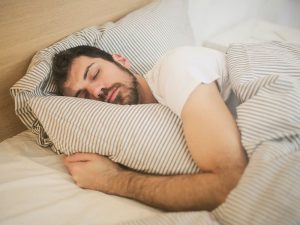Set Yourself Up for a Good Night’s Sleep
How’s your sleep? Are you getting as many zzz’s as you’d like? Do you wake up groggy and go about your day feeling tired and in a daze?
Here are some suggestions that may help you sleep better and improve your mental and physical health.

- Set-up a nightly routine: One of the most important things you can do is set up a nightly routine. This will help your brain to shut down and get ready for rest. It might look like this:
- An hour before heading to bed
- Dim the lights
- Decrease mental and emotional stimulation
- Playing video games, especially intense, stressful games with rapid light changes
- Turn off the television
- If social media or the news ramps up your anxiety, leave them until tomorrow
- Give yourself time to unwind
- Light your favorite candle and go about your nighttime routine – such as brushing your teeth by candlelight
- End your day with some simple stretches – work out those kinks
- Listen to relaxing music – save the dance jams for daytime
- Meditate
- Enjoy the scent of essential oils
- Incorporate relaxation exercises and breathing techniques
- An hour before heading to bed
- Get comfortable: When you look at your bed, do you get a warm and cozy feeling? Do you imagine cuddling underneath the covers? Or do you anticipate another restless, uncomfortable night? If your body hurts, either during the night or when you wake in the morning, consider your physical sleeping conditions.
- Pretend you’re Goldilocks. Is your mattress too firm, too soft, or just right?
- Using a foam topper may be an option
- Are you resting your head on the correct pillow? Yes, there are different types of pillows – from side sleepers to expectant moms
- Do your hips ache?
- Think about putting a pillow between your knees
- Pretend you’re Goldilocks. Is your mattress too firm, too soft, or just right?
- What’s your sleeping environment?: Your sleeping environment can have a big impact on your sleep quality.
- Your room should be kept cool – around 65 degrees
- Avoid loud noises – a white noise machine can help alleviate loud background noise, plus it’s soothing
- The darker, the better – consider room darkening or blackout curtains
- Be like a burrito and sleep securely – try a weighted blanket
- What are you putting into your body?: Like all things in a healthy lifestyle, food and hydration play a big part in your sleep.
- Eat well and get plenty of water throughout the day
- Heartburn is the worst – avoid spicy or acidic food before bed
- Caffeine and nicotine are stimulators
- Unless you like visiting the toilet many times a night, avoid drinking a lot of liquids in the evening
- A glass of alcohol can be relaxing, but it’s a diuretic and can cause you to visit the bathroom more
- What are you doing to your body?: Are you moving it? Exercise helps you sleep better. It doesn’t even have to be much. Enjoy a ten-minute after-dinner stroll to help improve your sleep.
- If it’s not an earthquake, what’s shaking your bed?: Do you have a sleeping partner? Be it human or beast? Do they toss and turn all night? Do they hog the bed or blankets? Could they win an award for their snoring?
- You might want to consider a change. Studies have shown that people sleep better in their own beds. Maybe the Leave it to Beaver show was on to something. Twin beds might make for a better night’s sleep.
- What do you do if you wake in the middle of the night?: No matter how good you sleep most of the time, there will be sleepless nights. When they happen, keep these things in mind:
- Definitely do not look at the clock – as a matter of fact, don’t have a clock visible
- Avoid stimulation – put your cell phone across the room, so it’s not easily accessible
- Keep the lights off
- Try not to think about falling asleep and, instead, use relaxation techniques
Hopefully, you will soon be having sweet dreams instead of counting sheep.
Recent Posts









